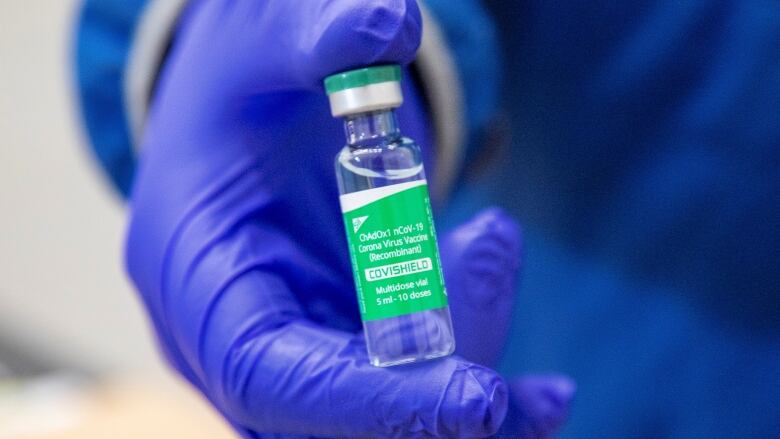AstraZeneca messaging doesn't sit well with Winnipeg scientist with rare blood disorder
Woman with rare blood disorder wishes for more vaccine guidance for people like her

Health officials are reassuring the public that potential side effects from theAstraZeneca-Oxford vaccine are exceedingly rare if there's a linkat all but those reassurances bring no comfort to a Winnipeg scientist who has a rare blood disorder and lingering concerns.
"Talking to someone who already has a rare condition of the likelihood of having something else negative happening to them really doesn't sit well," the woman said.
"It's insulting in some ways, because you know getting this disease is rare actually it's three in 100,000 so great, I was lucky enough to make that."
CBC News is protecting her identity because she works in the health field and fears sharing her views could jeopardize her job.
The province limited its AstraZeneca rollout Monday, as did Canada's National Advisory Committee on Immunization (NACI), citing concerns over blood clots in rare cases, primarily in women in Europe below the age of 55.
AstraZeneca was being offered to Manitoba adultsbetween the ages of 50 and 64, but that'sbeen moved up to 55 to 64.
Numerous European countries paused AstraZeneca rollout earlier this year over similar concerns, only to resume more recently following a large review by Europe's drug watchdog.
The European Medicine Agency review found no causal link between clots and that vaccine.
The latest data suggests the likelihood of such a blood clot associated with AstraZeneca is somewhere in the range of one in 100,000 to one in a million.
However, the EMA couldn't rule out the possibility of a link to rare blood clot types such as thrombocytopenia, a condition involving low levels of blood platelets.
Questions overAstraZeneca
The Winnipeg research scientist has immune thrombocytopenic purpura. ITP isa rare disorder involving low production of blood platelets, which help with clotting. Essentially, the immune system attacksplatelets.
She isn't aware of a link between her blood disorder and the potential risks that are being investigated now, but she still has questions about AstraZeneca in particular.
She and her partner are in their early 50s and qualified for AstraZeneca in Manitoba prior to the pause, but theydon't anymore.
Being pro-vaccine, she asked a specialist last week about whether she should get AstraZeneca or wait for one of the others.
She was told people with ITP have a higher risk of dying if they get COVID-19, and the specialist also suggested the benefits outweighed the risk. That left her wondering whether her concerns were valid or she was overreacting.
"If I would have made the decision to get it, I think I would have been in a bit of a high stress environment right now," she said. "I would be extremely worried that in the next couple of days I could have a reaction."
Dr. Jayson Stoffman, medical director of the Manitoba Bleeding Disorders Program, says thrombocytopeniaoccurs when platelets stick together in an abnormal way. Clumpingcan bringthe overall level of platelets in the body down,sometimes causing blood clots rather than preventing bleeding as designed.
He said for reasons that aren't yet clear, scientists are probing whetherAstraZenecamaybe triggering platelet production in a small and otherwise young and healthy group ofmainly women.
Rapidly shifting situation
There is no current research that suggests people with other bleeding disorders would be particularly at higher risk, he says.
The Canadian Hemophilia Society generally advises all members to get vaccinated including thosewith rare disorders,thrombocytopenia or platelet function disorders. A spokesperson with the CHS says that advice hasn't changed.
Stoffmansays as more evidence emerges,recommendations could change or even include guidance against people with conditions associated with low platelet counts getting AstraZeneca.
"But we can't say that yet, because right now the information is still new."
He says it's been suggested that that one reason thrombocytopeniamay appear to be more prevalent than might be expected is because at this stage women under the age of 55 in Europewere among some of the first to get the AstraZeneca vaccine.
"If the vaccine is more often going to people in that demographic, then the rare side effect is more likelyto show up in that demographic."
'A real shmozzle'
Dr. Joss Reimer, lead of Manitoba's vaccine task force, says further investigation is needed on any potential link, but she emphasized any risk of serious clotting events remains "very rare."She said on Monday there hasn't been any cases of blood clot events post-AstraZeneca vaccine here.
Her advice to the roughly 14,000 Manitobans who have already received the vaccine was to be mindful of symptoms commonly associated with strokes and heart attackssuch assevere persistent headaches, seizures, difficulty moving, severe chest pain or shortness of breath.
The Winnipeg research scientists says she recognizes why public health messaging so far has skewed more toward reassuring the masses, but she wishes there was a little guidance provided for the small slice of the population like her.
Calgary-based urgent care physician Dr. Raj Bhardwajsays the AstraZeneca is overall a very good and effective vaccine.
"The problem is the messaging around the vaccine has been a real schmozzle," he said.
With files from Erin Brohman













_(720p).jpg)


 OFFICIAL HD MUSIC VIDEO.jpg)
.jpg)



























































































